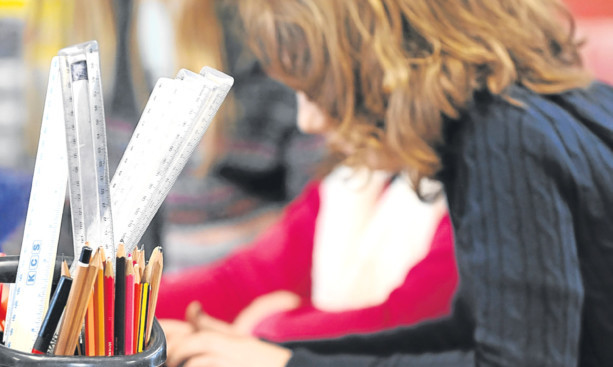
Teachers are warning of a class divide in schools as rising numbers of well-off parents resort to hiring tutors to help their children pass controversial new exams.
National qualifications were brought in to replace Standard Grades as part of the Curriculum for Excellence. In just over a month, more than 50,000 teenagers will sit the exams for the first time.
But fears have been raised about their introduction fuelling the social divide.
Experts claim increasing numbers of parents who are worried the new exam system has sparked chaos in classrooms are turning to private lessons.
Alan MacKenzie, of the Scottish Secondary Teachers’ Association, said: “A lot of colleagues are doing a extra tutoring particularly in English and Maths. The increase is being driven by parents’ anxiety caused by the uncertainty attached to these new exams.
“It’s worrying the degree of private tutoring that is going on. It undoubtedly gives the kids that can afford it a better chance of passing. It is in effect creating a two-tier education system between the haves and have-nots.”
The warning is the latest controversy to hit the National exams. In January a survey revealed school staff are unhappy about a lack of support from the Scottish Qualification Authority, which runs them.
Teachers described the new system as a “shambles” and complained about having had little time to adapt their techniques to suit it. And last week unions warned the Scottish Parliament that some teachers were having to work 60 hours a week to get pupils ready for the exams.
A spokesman for the EIS said: “The current tight timescale for the introduction of the new exams is creating additional pressure for both teachers and pupils in the run up to the exams. It is understandable that parents might look to supplement their child’s school education with additional time with a home tutor.”
A retired English teacher now tutoring who asked to remain anonymous added: “All the tutors I know are busy. Traditionally, it’s a great bonus for teachers to do outside of work, especially young ones not on a great deal of money.
“I’ve got as much business as I want and can pick or choose at the moment. It’s good news for us.”
There are currently no figures on how many private tutors are teaching in Scotland. But organisations have said anecdotal evidence suggests their use is soaring.
Janette Wallis, of the Good School Guide, which reviews UK schools, said: “It’s difficult to measure how many parents are using private tutors for school. It’s unregulated and immeasurable many parents lie about using them if they do and it could apply to someone who used them once or a hundred times.
“But one thing is for sure it’s on the increase particularly in urban centres like Edinburgh. New exam and testing methods drive a parent’s neurosis and can increase the demand for tutoring.
“Traditionally, education is split into a two-tier system between private schools and state schools. But the increasing use of tutors has created an invisible divide in state schools too between those who can afford it and those who can’t.”
John Dickie of Child Poverty Action Group warned there was already massive divides in state schools.“There are stubborn attainment gaps in Scottish schools between those on a low income households and those with a higher income,” he said.
A spokeswoman for the Scottish Government said:“Teachers and pupils are working extremely hard to prepare young people for the new qualifications.
“The Scottish Government and national agencies have provided unprecedented levels of resources to support them, including for new books and teacher time, and funding to support parental
engagement.”

Enjoy the convenience of having The Sunday Post delivered as a digital ePaper straight to your smartphone, tablet or computer.
Subscribe for only £5.49 a month and enjoy all the benefits of the printed paper as a digital replica.
Subscribe